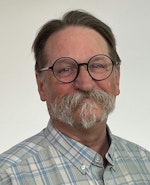DARPA asks industry to demonstrate RF and microwave filtering and interference suppression for AESA antennas
ARLINGTON, Va. – U.S. military researchers are pursuing new RF and microwave technologies to suppress RF interference, and want to demonstrate these technologies for future military use.
Officials of the U.S. Defense Advanced Research Projects Agency (DARPA) in Arlington, Va., issued a broad agency announcement last week (HR001124S0027) for technical area 2 of the agency's COmpact Front-end Filters at the ElEment-level (COFFEE) program.
While the COFFEE program is developing interference-mitigating RF and microwave technologies for active electronically scanned array (AESA) transmit-and-receive antennas, the project's technical area 2 seeks to demonstrate COFFEE-developed technologies in military applications.
COFFEE seeks to create a new class of high-frequency filters with low loss and high power handling. COFFEE contractors are Northrop Grumman Corp., Raytheon Technologies Corp., Akoustis, BAE Systems, Metamagnetics, Georgia Institute of Technology, Columbia University, Carnegie Mellon University, University of Michigan, University of Texas at Austin, and University of California at Los Angeles.
Related: Northrop to cut RF and microwave interference
An AESA antenna’s ability to reconfigure radar beams dynamically and communicate across a range of frequencies is especially important in congested environments, DARPA researchers explain. This helps resist signal jamming and interception while mapping, navigating, sensing, tracking and creating high-bandwidth data links.
The COFFEE program seeks to create RF and microwave filter technology to mitigate AESA interference and enhance performance in 2 GHz to 18 GHz frequency ranges. These filters will distill signals while operating within an 18 GHz half-wavelength array pitch, and account for digital-at-every-element advances.
The primary focus of the COFFEE program is on emerging microelectronics materials for integrable filters; new classes of miniaturized resonators; millimeter-wave frequencies beyond 18 GHz; and future communications for the 5G era.
Now, the COFFEE technical area 2 seeks to demonstrate the newly expanded potential of COFFEE technology by integrating COFFEE filters to demonstrate interference suppression in all or parts of the 2 to 18 GHz frequency range; incorporate frequencies above 8 GHz; and create RF and microwave filters with compact size and high performance.
Related: Mitigating electromagnetic and radio-frequency interference
COFFEE technical area 2 also seeks to demonstrate acceptable manufacturability of COFFEE RF filters; and develop disruption potential that departs from current practices in filter design and manufacture.
Proposers should show clearly how they will achieve the disruptive potential of COFFEE technology and how the effort supports switching enabling technologies to current and future military programs.
COFFEE filters will be integrated into systems and external components such as switches, controls, interconnects, interposers, and tuning elements that risk degrading system performance and increasing overall filter size.
COFFEE technical area 2 will apply COFFEE filter technology currently under development. The effort will highlight technical risks, mitigation strategies, and recent innovations. Solutions that use domestic manufacturing are preferred.
Related: Shielding against electromagnetic and RF interference for safety and mission success
COFFEE technical area 2 is an 18-month effort, starting in 2025, that will validate COFFEE technologies by integrating 2–18 GHz filters with switches, controls, interconnects, and interposers into a filter tile. Several contract awards are expected.
The effort will culminate with delivery of integrated filter tiles to demonstrate the potential for scalable manufacturing and interference suppression.
Companies interested should submit abstracts no later than 4 June 2024, and full proposals no later than 2 Aug. 2024, to the DARPA Broad Agency Announcement Tool (BAAT) online at https://baa.darpa.mil/Public/SecurityAgreement.
Email questions or concerns to Tood Bauer, the DARPA COFFEE program manager, at [email protected]. More information is online at https://sam.gov/opp/eb034f8d6017452ca0cc3ba3054a8a0a/view.

John Keller | Editor-in-Chief
John Keller is the Editor-in-Chief, Military & Aerospace Electronics Magazine--provides extensive coverage and analysis of enabling electronics and optoelectronic technologies in military, space and commercial aviation applications. John has been a member of the Military & Aerospace Electronics staff since 1989 and chief editor since 1995.

